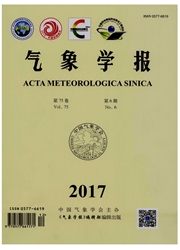

 中文摘要:
中文摘要:
2007年12月13-14日,南京出现一次厚度达600 m、持续近14 h的浓雾过程,其中强浓雾阶段维持4 h.通过系留气球边界层探测系统、涡动协方差测量系统、雾滴尺度分布和自动气象站等外场试验资料分析了此次深厚浓雾过程的边界层结构特征和生消物理机制.结果表明,此次雾过程首先由地面辐射冷却形成贴地雾层,而后因低空平流冷却形成低云.在发展阶段,伴随低云不断下伸,贴地雾层不断抬升.在贴地雾层受到地面弱冷空气平流降温影响下,雾中微物理过程迅速发展,雾滴数密度、含水量、平均直径、最大直径等微物理参数在15 min内跃增,雾体爆发性升高,最终导致地面雾和低云上下贯通形成深厚雾层,地面能见度骤降至15 m以下.雾体爆发性增强时,地面垂直动量通量和向下长波辐射通量密度增大,净辐射趋于零.整个雾过程中,由于贴地层持续弱冷平流降温和上层雾阻碍了下层雾的辐射降温,二者的共同作用使贴地强逆温结构始终维持.
 英文摘要:
英文摘要:
The field experiments were conducted during a deep dense fog event that occurred in Nanjing on 13 - 14 December 2007.This fog event persisted for 14 hours,including a 4-hour super dense fog stage.The related boundary layer structure and physical mechanisms for the fog event were analyzed based on the field observations from tethersonde system,the eddy covariance system,the fog droplet spectrometer,and the automatic weather station,etc.Formed through radiative cooling,the surface fog layer was followed by a cloud layer caused by low-level cold advection.The thickness of the surface fog layer increased and the cloud layer descended to lower altitudes in the development stage.With the influence of weak cold advection just above ground,the surface fog layer entered its burst evolution with some microphysical parameters such as number concentration,liquid water content,mean and maximum diameter increased significantly in 15 min.The rising surface fog combined with descending low-level clouds to form the deep dense fog with the visibility less than 15 m and the thickness of the combined fog layer reached 600 m.Both the vertical momentum and downward long-wave radiation fluxes increased significantly at the beginning of the burst stage,and the net radiation fluxes approached zero at the same time.A strong surface inversion layer persisted throughout the successive stages of fog evolution because of the continuous weak cold advection in the ground layer and the radiative cooling of the lower fog layer restrained by the upper fog layer.
 同期刊论文项目
同期刊论文项目
 同项目期刊论文
同项目期刊论文
 Tropospheric NO2 columns over East Central China: Comparisons between SCIAMACHY measurements and nes
Tropospheric NO2 columns over East Central China: Comparisons between SCIAMACHY measurements and nes 期刊信息
期刊信息
